
Related
Protests continue in Chicago after police shot dead two more unarmed African Americans—Bettie Jones, a 55-year-old mother of five, and 19-year-old college student Quintonio LeGrier. The shooting comes amid outrage over the more than year-old police killing of 17-year-old Laquan McDonald and a potential police cover-up. Could these killings force Mayor Rahm Emanuel to resign? We are joined by Aislinn Sol of Black Lives Matter Chicago.
Transcript
AMY GOODMAN: A police shooting in Chicago has killed another two unarmed African Americans, sparking grief, outrage and new calls for change at a police department already under heavy scrutiny. The killings happened early Saturday morning when officers responded to a domestic disturbance call. The father of a 19-year-old college student named Quintonio LeGrier had called police to report his son was behaving oddly and carrying a metal bat. The father also called the downstairs tenant, 55-year-old Bettie Jones, to alert her that police would need to enter through her door. When the police arrived, Quintonio LeGrier allegedly confronted them in the foyer. Both LeGrier and Bettie Jones were killed when police opened fire. On Sunday, family, friends and community members gathered outside the home to remember the victims and demand justice from the police. Quintonio LeGrier’s mother, Janet Cooksey, was among those to speak out.
JANET COOKSEY: Something just needs to be done. I used to watch the news daily, and I would grieve for other mothers, other family members. And now, today, I’m grieving myself. When do it come to an end? I mean, when do we get answers? I mean, like she said, what happened to Tasers? Seven times my son was shot. No mother should have to bury her child, and especially under these circumstances. You call for help, the police are supposed to serve us and protect us, and yet they take the lives. What’s wrong with that picture? It’s a badge to kill? I mean, where do we get our help?
AMY GOODMAN: Janet Cooksey, mother of Quintonio LeGrier. He reportedly had suffered mental health issues in recent months. The other victim, Bettie Jones, was the mother of five grown children, with whom she had just celebrated Christmas hours before. She was also involved in community activism. Police have acknowledged they shot her by accident. Jacqueline Walker, who grew up with Bettie Jones, remembered her friend.
JACQUELINE WALKER: I knew Bettie as a kid. We grew up on Congress, in the 4,400 block of Congress. And we played together every day. And for me to just look at the news and see that she was shot down—a beautiful woman, a beautiful woman—it hurts my heart to see that. It hurts me all over just to know that the family is going through this tragic danger thing that’s going on—police shooting without asking. Why you got to shoot first and ask questions later?
AMY GOODMAN: Full details have not been released, but family members say Bettie Jones was shot four times and Quintonio LeGrier seven times.
Saturday’s shooting comes amidst continued protests in Chicago over the more than year-old police killing of 17-year-old Laquan McDonald and a potential police cover-up. McDonald was African-American. He was shot 16 times by white police officer Jason Van Dyke. Dash cam video, only recently released by court order, clearly contradicts police claims about the shooting. Laquan McDonald posed no threat and was walking away from the officers at a distance as Van Dyke jumped out of his police car and opened fire.
The controversy has ousted the Chicago police chief and the head of the city’s Independent Review Authority—Independent Police Review Authority, which investigates police shootings. It’s also sparked calls for Mayor Rahm Emanuel’s resignation. The mayor says the Police Review Authority is probing Saturday’s killings. Since 2007, the authority has found wrongdoing in only two of out of more than 400 police shootings.
Meanwhile, a year-end report from the Mapping Police Violence research project says police killed at least 1,152 people in the United States in 2015. In 14 cities, every single police victim was African-American.
For more, we’re joined by Aislinn Sol, chapter coordinator for Black Lives Matter in Chicago, which has organized a series of protests over the killing of Laquan McDonald.
We welcome you to Democracy Now! Why don’t you start off by explaining to us what you understood happened this weekend, Aislinn?
AISLINN SOL: Well, the day after Christmas at 4:00 in the morning, after both families celebrated the holiday with loved ones, the police were called by the father of Quintonio in order to respond to a mental health, domestic violence situation—as what the media has been calling it. The police then, from—based on the evidence, based on the reports that we have now, we believe that the police shot through the door, killing Bettie Jones, who was a member of Action Now, which is a grassroots organization here in Chicago, a 55-year-old mother of five, and shot her in the neck, killing her on the way to the hospital. And then they shot and killed 19-year-old Quintonio, and they shot him seven times. He was not holding a gun. He was not pointing a gun at them, which is usually the excuse that’s given for these types of murders. And, you know, unfortunately, now we have two people who have been taken away from us too soon by this corrupt system.
AMY GOODMAN: There have been calls for the resignation of Mayor Rahm Emanuel since the Chicago Police Department released the video of the shooting of Laquan McDonald after holding it for more than 400 days. Evelyn Glover, who is the cousin of Bettie Jones who was killed by the Chicago police officer on Saturday, echoed the calls for his ouster.
EVELYN GLOVER JENNINGS: You meet me at City Hall. I want my cousin’s death avenged. You killed her in cold blood. Emanuel—
UNIDENTIFIED: Step down.
EVELYN GLOVER JENNINGS: Emanuel, call your boys. Chicago police belong to you. Now you vigilante, you’ve been sending the Chicago police out to kill, to do nothing but kill. Get “serve and protect” off of them cars and write, “We kill,” 'cause that's your mission, you lying demon.
AMY GOODMAN: That was Evelyn Glover, the cousin of Bettie Jones who was killed by Chicago police early on Saturday morning. Aislinn Sol, what about this demand?
AISLINN SOL: He should resign. And not only should he resign, Anita Alvarez should resign, and the entire City Council should resign. And charges of obstruction of justice should be brought forth, where applicable, with all parties involved in the cover-up of Laquan McDonald’s video, as well as the cover-up of Ronald Johnson’s dash cam video. Ronald Johnson was killed eight days prior to Laquan McDonald by Officer George Hernandez, and that video was hidden for over 400 days. And after a FOIA lawsuit filed by Ronald Johnson’s mother, it was finally released. There are multiple guilty parties here, and all of them need to be held accountable, including criminal charges of obstruction.
AMY GOODMAN: Earlier this month, Chicago Mayor Emanuel apologized for the killing of Laquan McDonald. This is what he said.
MAYOR RAHM EMANUEL: I am the mayor. As I said the other day, I own it. I take responsibility for what happened, because it happened on my watch. And if we’re going to fix it, I want you to understand it’s my responsibility with you. But if we’re also going to begin the healing process, the first step in that journey is my step, and I’m sorry.
AMY GOODMAN: Earlier this month, the Justice Department announced it will launch a wide-ranging investigation into the Chicago Police Department. This is Attorney General Loretta Lynch.
ATTORNEY GENERAL LORETTA LYNCH: Today, I’m here to announce that the Department of Justice has opened an investigation into whether the Chicago Police Department has engaged in a pattern or practice of violations of the Constitution or federal law. Specifically, we will examine a number of issues related to the Chicago Police Department’s use of force, including its use of deadly force; racial, ethnic and other disparities in its use of force; and its accountability mechanisms, such as its disciplinary actions and its handling of allegations of misconduct.
AMY GOODMAN: The announcement came after the protests over the police killing of Laquan McDonald, who was shot 16 times. The officer, Jason Van Dyke, was indicted for first-degree murder—only after, on the same day, hours after dash cam video was released that clearly contradicted police claims about the shooting. And the video was released only because it was ordered by a judge to be released. Aislinn, your response to how Mayor Emanuel is dealing with this? Now, he’s on holiday in Cuba, is that right?
AISLINN SOL: Yeah, he is, which is incredibly ironic, given the U.S. embargo against Cuba. However, his response is completely inadequate. Rahm Emanuel has—he’s unable and incapable of solving this problem, which he is partially responsible for. This problem of police terrorism in our communities has existed for many, many decades, leading way back to the assassination of Chairman Fred Hampton Sr. And, you know, what we know with Fred Hampton Sr.'s murder; with the torture that had gone on through the former police commander, Jon Burge, of over 119 black and Latino men; to Homan Square's operating today; to what happened with Rekia Boyd, to Ronnie Johnson, to Laquan McDonald—all of this indicates that there’s a deep, embedded structural pattern and practice of terrorism and murder that has been—that has gone on for decades with complicit participation by many levels of government in Chicago. His apology means nothing.
AMY GOODMAN: You mentioned Fred Hampton, who, together with Mark Clark—they were leaders of the Black Panther Party in Chicago—were killed by police December 4th—was it?—1969, killed by Chicago police. You are wearing a T-shirt that says “Emmett & Amadou, Sean”—and that’s as far as I could see right now.
AISLINN SOL: Yeah.
AMY GOODMAN: But Emmett, the first name we see, is Emmett Till, who was also from Chicago. And that was back in the summer of 1955, killed in Mississippi. And, of course, his case, this 14-year-old boy killed by a white mob, has shaped Chicago politics, or had a tremendous influence, I should say, for many decades.
AISLINN SOL: Yeah, and, you know, we work closely with the Emmett Till family. They just, you know, celebrated the 60th anniversary of remembering his life, which just occurred this past year. And they have been at the forefront of fighting against terrorism against black people. You know, of course, historically, we can reference his mother, Mamie Till-Mobley, who really helped lead the creation of the black power movement and civil rights movement by her steadfast refusal to remain silent. And we see other mothers duplicating that today, like Dorothy Holmes, the mother of Ronald Johnson, and the mother of Quintonio, who both are steadfast and refusing to remain silent and are demanding justice.
AMY GOODMAN: Chicago has long had this long history of police torture. Earlier the year—you mentioned the notorious Chicago police commander—Jon Burge was released from a halfway house after he served four-and-a-half years for lying under oath. Now, he was accused of leading a torture ring that interrogated more than a hundred African-American men in Chicago in the '70s and ’80s. Routinely, electric shock, suffocation with plastic bags and typewriter covers were used, among other methods, to extract confessions from men who were later shown to be innocent. The Chicago Torture Justice Memorials Project documented some of the men's stories. This is Shadeed Mu’min.
SHADEED MU’MIN: He handcuffed me real tight, know what I’m saying? He cut my circulation off. He went out of the room and stayed, I guess, for about an hour, and then came back and tried to talk to me. What could I tell him, you know, about the robbery? I told him, “I couldn’t tell you anything about no robbery. I know nothing about what you’re talking about.” And he said then that, “Oh, you’re going to play tough.” Said, “You will tell us, before you leave here, what we want to know.” Said, “I’ve been known to get out of peoples what I want.” He got real upset and said, “You will talk, you black mother [bleep].” He said, “I’ll make you talk, or kill you as I want.” So, I still don’t understand. So he—in anger, he rushed to the typewriter and grabbed the plastic cover off there and just crammed it down over my head. And it’s like he was a madman. And several officers were helping him. But I was trying to get my arms out from behind the chair, but I couldn’t do anything. And I passed out. And like I say, he gave me a breath of air. And I came to, conscious. And he—”You ready to talk?” And I said, “I don’t have anything to tell you still.” So he do it again. The third time, out of the third time, that’s when I told him, I said, “I’ll tell you whatever you want to know, man. Just don’t do this no more.”
AMY GOODMAN: So, that is talking about what happened under Jon Burge’s reign in the Chicago Police Department. Aislinn, what you’re demanding now, in this last week of 2015?
AISLINN SOL: We’re demanding that Homan Square be closed, because although we have the name of Jon Burge and we know that the torture of over 119 black and Latino men occurred, torture continues to happen today under Rahm Emanuel’s watch at Homan Square and other black sites. We’re demanding that Homan Square immediately be closed and that all parties responsible for its operation be investigated and charged with criminal acts. We’re demanding that the Chicago police immediately become disinvested by the city government. The city government’s budget accounts for 40—40 percent of the operating budget goes toward CPD. Meanwhile, we have schools that have closed. Chicago conducted the largest U.S. mass school closing in history. And we need all of those schools reopened. Rahm Emanuel closed half of the city’s mental health centers. We need all of those reopened. We need a jobs program. We need free and affordable housing for the homeless. We need an intense disinvestment in this police system, and we need a complete political uprising and reorientation of how the government is run in Chicago.
AMY GOODMAN: Aislinn Sol, I want to thank you for being with us, chapter coordinator for Black Lives Matter Chicago.

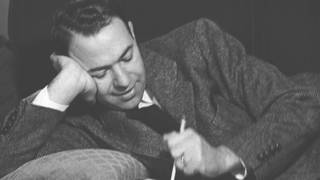
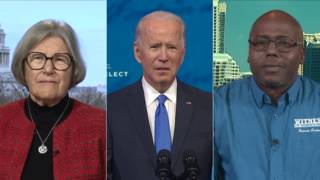
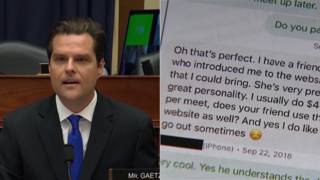
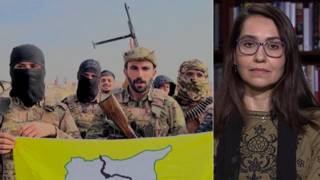





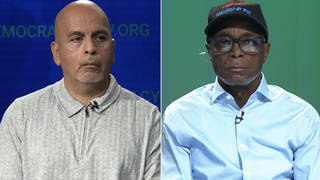
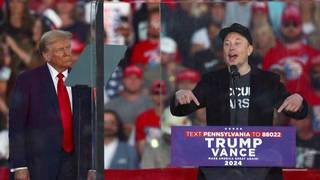
Media Options